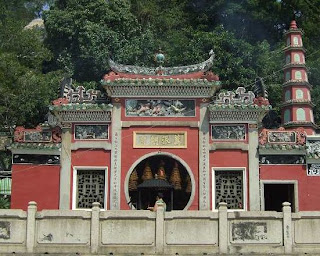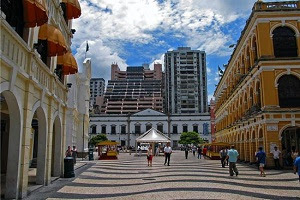Last week, I
travelled to Macau as a representative of China Holidays to take part in a
familiarisation trip. Macau had always seemed to be foreign to not only me but
the majority of the British population. When we think of Macau, it is seen as a
destination that requires no more than a day at the end of a Hong Kong-centric
holiday, or a location that’s main focus is on gambling and casinos. However,
whilst on the fam trip, my tour guide, who was of Portuguese descent, opened my
eyes to the wonder and history that Macau has to offer and explained to me how
Macau is attractive in so many different ways besides its history as the
gambling centre of the East.
 On my first
day in Macau, I was taken to the historic centre of Macau in the northern
peninsula section of the region. This walkable area is made up of an array of
UNESCO world heritage sights, and is where tourists can really experience the
Portuguese influence on the city. The majority of the buildings are brightly
coloured, and ooze with catholic influences that seem so foreign in the rest of
East Asia. We also took a visit to the A-matemple. As 75% of Macau’s residences are staunch Taoists, it was
fascinating to see how these people worshipped the goddess of Sea-farers so
adamantly, by lighting incense and praying in front of her statue. In the
evening, we walked Senado Square,
the heart of the Peninsula where decorative Portuguese mosaic tiles pattern the
floor so eye-catchingly.
On my first
day in Macau, I was taken to the historic centre of Macau in the northern
peninsula section of the region. This walkable area is made up of an array of
UNESCO world heritage sights, and is where tourists can really experience the
Portuguese influence on the city. The majority of the buildings are brightly
coloured, and ooze with catholic influences that seem so foreign in the rest of
East Asia. We also took a visit to the A-matemple. As 75% of Macau’s residences are staunch Taoists, it was
fascinating to see how these people worshipped the goddess of Sea-farers so
adamantly, by lighting incense and praying in front of her statue. In the
evening, we walked Senado Square,
the heart of the Peninsula where decorative Portuguese mosaic tiles pattern the
floor so eye-catchingly. 
The next day
we went to one of the highest points in Macau to see the Guia Fortress and lighthouse. This UNESCO heritage sight was
built in the 17th century to protect Macau from a failed attack by
the Netherlands. Afterwards, we went to the
Grand Prix museum and the Macau wine
museum. The Grand Prix museum celebrates the Formula 3 race that takes part
within the city of Macau. For one week in November, certain roads in the city
are closed off for this annual event which brings with it great entertainment
and sophistication that seems so fitting in Macau. The wine museum opened my
eyes up to the wide selection of Portuguese wines available in Macau, and discouraged
any negative thoughts I had previously had on Chinese wine.
On our final
day in Macau, we visited the MacauTower. As the highest building in Macau, the Macau tower offers a wide
selection of activities, including the opportunity to walk around the edge of
the tower at its highest point as well as having the unnerving chance to bungee
jump off the tower! We later visited Macau’s 3 beaches in the southern part of
the city. Similar to those in LA or the south of France, the beaches stretch
for a long distance and are coated in golden sand and beautiful beach house
architecture.
Like the
rest of China, Macau is the home to some of the most delicious food on the
planet. What is truly delicious about Macanese cuisine is its ability to so
perfectly blend Chinese and Portuguese influences that gives both a unique yet
strangely homely and familiar feeling to the taster’s palette. Macau is also
home to the legendary Pastel de nata, a Portuguese style of egg tart,
differencing in its use of short crust pastry and strong mouth-watering flavour
and taste.
Macau is
truly a city of surprises. Yes, casino-culture is extremely apparent in the
city and brings about the majority of the city’s revenue and tourist capacity
(primarily from the PRC); and yes, playing in the casinos for a short while is
truly fun and a real experience. However, what the city has to offer on top of
gambling is much more appealing to me, and to all the other travel fans like
myself, I would imagine.
For more
information about travelling to Macau or any other part of China please email Tom at sales@chinaholidays.com or call on
020 74872999



No comments:
Post a Comment
Comment is free